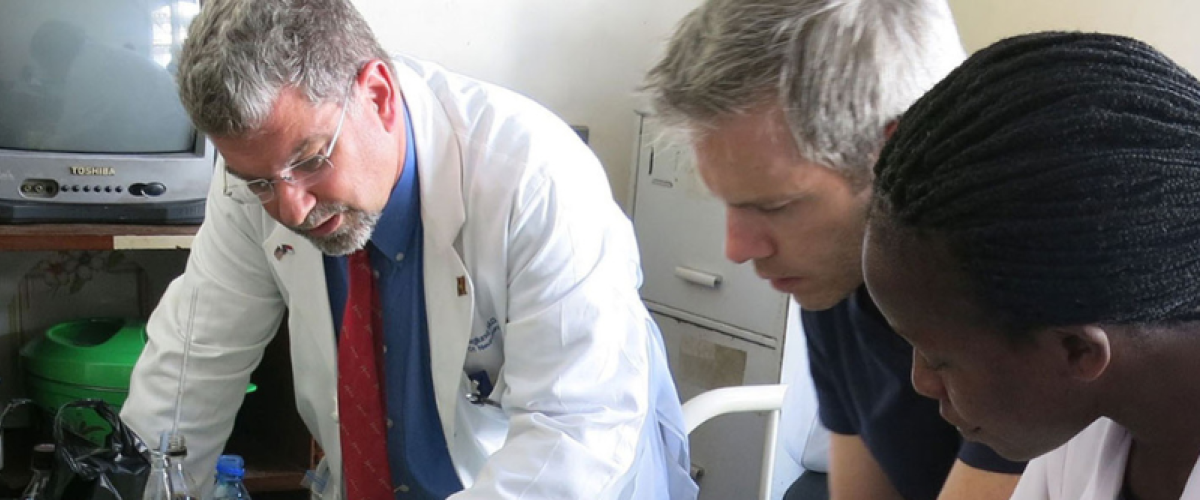
The Duke Global Neurosurgery and Neurology (DGNN) Division leads a growing portfolio of research, education, and service initiatives that strengthen neurological and neurosurgical care in low- and middle-income countries. Our focus areas—Neurosurgery, Epilepsy, and Rehabilitation—represent an essential continuum of care for patients with neurological disease and injury.
Through these programs, DGNN combines rigorous academic research with hands-on clinical collaboration, working side by side with local partners to design, test, and sustain innovative solutions that improve access, outcomes, and systems of care.
DGNN’s neurosurgery focus is built on more than a decade of partnership and capacity-building across East Africa. What began with surgical mentorship and training has evolved into a comprehensive model that integrates education, systems research, and infrastructure development.
Our neurosurgery initiatives aim to strengthen local surgical capacity, expand research on neurological diseases, and advance policy for sustainable neurosurgical systems. Through these collaborations, DGNN and its partners are improving access to safe, high-quality brain and spine surgery for patients who need it most.
Highlighted Projects
- East Africa Neuroscience Institute (EANI)
DGNN is partnering with NeuroHope Africa Foundation and Build Health International to develop the East Africa Neuroscience Institute, a three-story addition to Mbarara Regional Referral Hospital that will expand inpatient neurosurgery and neurology services, critical care, and rehabilitation capacity in Western Uganda.
- Infrascanner Studies
This multi-site study evaluates a portable near-infrared device (InfraScanner 2000™/2500™) for detecting intracranial hematomas in resource-limited settings. By validating noninvasive diagnostic tools, DGNN is helping make life-saving brain surgery more accessible worldwide.
- Neural Tube Defects (NTDs) in Uganda
DGNN researchers are examining environmental and genetic risk factors for neural tube defects in newborns, collecting biological and clinical data to inform prevention strategies and strengthen maternal health policies.
DGNN’s epilepsy program seeks to improve the care of people with epilepsy in Uganda through collaboration with scholars, policymakers, and community stakeholders. Our work begins with listening—understanding how epilepsy is experienced, perceived, and treated within the cultural and social realities of Ugandan life.
Through patient-centered research, training, and community partnerships, DGNN works to expand access to diagnosis and treatment, reduce stigma, and inform evidence-based national policy. The stories of patients, caregivers, and providers—marked by courage, perseverance, and hope—guide our efforts to build an ever-improving landscape of care.
Highlighted Projects
- AWE Change Project (R01)
This NIH-funded study characterizes epilepsy and its comorbidities in Uganda, examines the impact of stigma on adolescents, and develops community-based interventions to improve health literacy and resilience.
- SMART App for Epilepsy Self-Management
DGNN is developing and testing a mobile application designed to support self-management and resilience among adolescents with epilepsy, bridging technology and public health for long-term impact.
- Epilepsy Surgery Needs Assessment
In collaboration with Makerere University and Mulago Hospital, this project evaluates the feasibility of epilepsy surgery in Uganda, assessing current resources, provider attitudes, and the prevalence of surgically treatable epilepsy.
As DGNN’s partnerships have expanded neurosurgical and neurological care capacity, a new challenge has emerged: how to ensure that patients not only survive but also thrive after injury or illness. Rehabilitation fills that critical gap.
DGNN’s rehabilitation initiatives, launched in 2020, focus on building systems, training providers, and conducting applied research to strengthen rehabilitation capacity within Uganda. By collaborating with hospitals, universities, and community partners, DGNN supports a holistic approach to neurological care that restores independence and quality of life.
Highlighted Projects
- Hospital-to-Home Discharge Planning (HSS: Bass 1–4)
A series of studies designed to develop and evaluate multidisciplinary discharge planning models, improving continuity of care and rehabilitation follow-up for neurosurgical patients in Uganda.
- Rehabilitation Database Development (HSS MScGH Project)
This initiative defines essential data elements for national rehabilitation tracking, laying the foundation for outcome monitoring and quality improvement across facilities.
- Inpatient Rehabilitation Expansion (Educational & Infrastructure Initiative)
DGNN and partners at Mbarara University of Science and Technology are developing inpatient rehabilitation services and expanding training opportunities for rehabilitation professionals across Uganda.